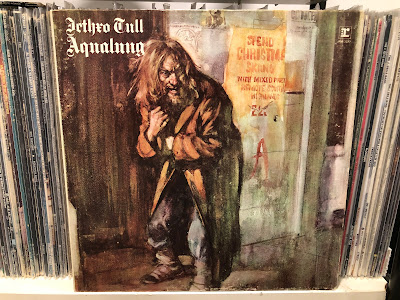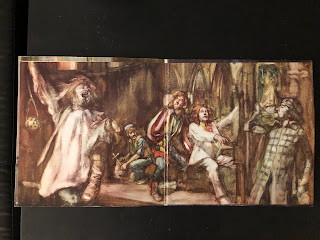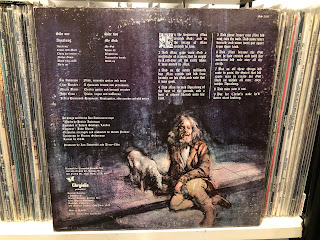Aqualung, released in 1971, was the band's fourth album. Jethro Tull would release an album a year from 1968 to 1980, and then they'd slow down a little, but keep dropping albums through the '90s. I started my journey with Jethro Tull's Crest of a Knave, that gave the band an odd late career resurgence. I know that record gets shit on for being the fly in the ointment in Metallica's spooge party back in '89. Considering they had been releasing albums pretty consistently since 1968 it wasn't like they came out of nowhere. Were they metal? No, but they were rock enough to warrant being considered "hard rock" by the voting members.
Back to Aqualung, the year was 1971, and with the burgeoning Jesus movement Jethro Tull would take a different tact and pose a different set of philosophical questions relating to the nature of God and human nature and which came first the chicken or the egg. Or in this case to paraphrase AC/DC "Who Made Who?" It's no wonder so many Christians took exception to the album, but then again these are the same folks who would hang Larry Norman out to dry too, so there was no pleasing some people.
Yeah, I know. I don't pretend to be the sharpest tool in the drawer. Heck even with this one, I listen to the music, and if the lyrics fit and sound cool I'm generally happy. Whether Aqualung is a concept album or not doesn't really matter. It certainly gave the appearance of having a weighty self important air about itself. I mean, it was two songs, with a bunch of indented titles. That certainly lends itself to being a concept album, but is it?
Don't know. Don't care. I'm here for the music.
Jethro Tull was one of those weird bands that seemed to be the odd duck at the family barbecue. I have always liked the songs classic radio liked to play, "Aqualung" and "Locomotive Breath" and heck, who doesn't like to hear the flute in a rock song? I always thought Martin Barre deserved a lot more recognition for his contributions. Those who know, know - but it would be cool if more people knew. The guy is a tasty player and did what was needed to support and enhance the songs.
This is the first time I'm listening to the album in its entirety. It's not cranked but it's loud enough to fill the basement. For the most part the record sounds pretty good still, except for the drums. I know Clive Bunker is credited with a thousand drums and percussion, but there was little punch to the kick and the splat of the snare just seemed to be underwhelming. There was no sense of immediacy. I suspect the issue wasn't with him so much as the how things were recorded. This isn't to say they suck, they just felt off at times. I suspect I wasn't alone, as later I went and cranked up the 2016 remastered version of the 2011 Steve Wilson remix and it sounds awesome. Just goes to show how good the source material was to begin with. It is equally possible that I am completely full of shit too and I was just looking for something to criticize.Back to the record as originally released, on those songs where it's just acoustic guitar and voice. I love how front and centre Ian's voice is, and how crisp it is. It's not drenched in reverb, it's dry and urgent. It's like he's in the room with you. It's very intimate.
Considering the big songs are well, so big - it was actually a surprise really to realize most of the songs are predominantly acoustic, almost leaning into feeling a tad medieval with the recorders (yes, recorders) and stuff - which makes it so satisfying when you get to a song like "Locomotive Breath" it doesn't feel out of place, rather it's like a strange culmination of what had come before. I haven't even touched on Ian's flute playing, which is a high point throughout the album.
While I'm not a great authority on all things Tull, I mean I have a hand full of albums, but I can't really claim to be a huge fan. I like what I like, and I like this ... when I'm in the mood. Let's be honest, Jethro Tull isn't really a cursory listening experience. It takes time. When you can afford the time, the pay off is generally worth it.
When you don't have the time, the singles are pretty cool, but there's so much more.
These are the guys who made this one possible:
- Ian Anderson: flute, acoustic guitar and voice
- Clive Bunker: a thousand drums and percussion
- Martin Barre: electric guitar and descant recorder
- John Evan: piano, organ and Mellotron
- Jeffrey Hammond-Hammond: bass guitar, alto recorder and odd voices



Comments
Post a Comment